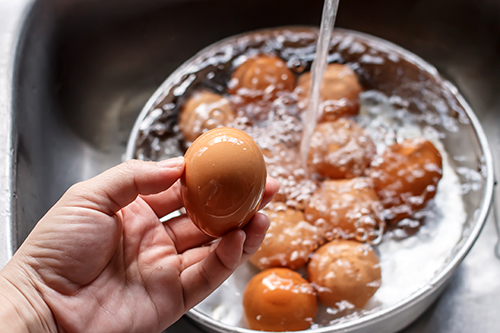Washing Eggs
Mar 29, 2021

Written by our friends atMannaPro
Egg washing practices are a highly debated topic among chicken enthusiasts.
There are many safe ways to prepare eggs for eating. With a little common sense and knowledge of egg anatomy, you can rest assured that your backyard eggs are safe and healthy to consume. The FDA lays out guidelines on their website that include tips on cooking safety.
If you are selling your eggs, be sure to contact your county Extension office to find out what the rules are for your state. But for the casual backyard chicken keeper, I encourage you to do some research, read articles like this and other Co-op blogs, then decide on the safest practice for your family.
Clean Eggs Start in the Coop
When you collect an egg from your nest box, as long as it has remained dry, the egg is protected in the bloom. This means the egg will stay fresh (in moderate temperatures) for several weeks without refrigeration.
When you wash an egg, you remove the bloom, which allows oxygen and bacteria to pass through the eggshell more quickly and easily. Therefore, it is recommended that washed eggs be refrigerated to slow the rate of spoilage.
Unwashed eggs should not be refrigerated because it is thought that the cooler temperature causes the pores of the egg to shrink. During this shrinking process, it is possible for bacteria to be sucked into the egg.
How to Wash Eggs
After collecting eggs from the coop, set them in a basket, unrefrigerated, until ready to use. When you need an egg, if it is visibly soiled, wash it with dish soap and warm running water using our designated “egg sponge.” After that, the egg should either be used immediately or refrigerated.
Use a dedicated egg sponge because it is unsanitary to wash dishes with the same sponge that has been used to remove chicken manure from eggs. Be sure to replace this sponge often.
You also want to use running water. Soaking eggs allows bacteria to pass back and forth through the eggshell.
For more information on all thing’s poultry stop by your local Co-op! Find the Co-op nearest you here.
For more content like this, check out the latest issue of the Cooperator.
Egg washing practices are a highly debated topic among chicken enthusiasts.
There are many safe ways to prepare eggs for eating. With a little common sense and knowledge of egg anatomy, you can rest assured that your backyard eggs are safe and healthy to consume. The FDA lays out guidelines on their website that include tips on cooking safety.
If you are selling your eggs, be sure to contact your county Extension office to find out what the rules are for your state. But for the casual backyard chicken keeper, I encourage you to do some research, read articles like this and other Co-op blogs, then decide on the safest practice for your family.
Clean Eggs Start in the Coop
- Egg boxes should be checked regularly for broken eggs or droppings.
- Bedding should be replaced often.
- Chickens should be discouraged from sleeping in nest boxes.
When you collect an egg from your nest box, as long as it has remained dry, the egg is protected in the bloom. This means the egg will stay fresh (in moderate temperatures) for several weeks without refrigeration.
When you wash an egg, you remove the bloom, which allows oxygen and bacteria to pass through the eggshell more quickly and easily. Therefore, it is recommended that washed eggs be refrigerated to slow the rate of spoilage.
Unwashed eggs should not be refrigerated because it is thought that the cooler temperature causes the pores of the egg to shrink. During this shrinking process, it is possible for bacteria to be sucked into the egg.
How to Wash Eggs
After collecting eggs from the coop, set them in a basket, unrefrigerated, until ready to use. When you need an egg, if it is visibly soiled, wash it with dish soap and warm running water using our designated “egg sponge.” After that, the egg should either be used immediately or refrigerated.
Use a dedicated egg sponge because it is unsanitary to wash dishes with the same sponge that has been used to remove chicken manure from eggs. Be sure to replace this sponge often.
You also want to use running water. Soaking eggs allows bacteria to pass back and forth through the eggshell.
For more information on all thing’s poultry stop by your local Co-op! Find the Co-op nearest you here.
For more content like this, check out the latest issue of the Cooperator.